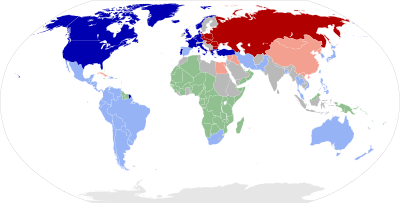冷战 (1953年—1962年)

北约成员国
美国的其他盟国
殖民地国家
华约成员国
苏联其他盟国
不结盟国家
| 冷战历史 |
|---|
 |
从1953年苏联领导人约瑟夫·斯大林去世到1962年古巴导弹危机的冷战历史如下所述。斯大林去世后,新领导人试图将苏联“去斯大林化”,导致东方集团及华约成员国的动荡。[1]尽管如此,国际紧张局势仍有缓和迹象,这一迹象可以在签署《奥地利国家条约》重新统一奥地利和日内瓦协议结束印度支那战争时看到。然而,这段美好的时光只是暂时的,在这段时间里,一场昂贵的军备竞赛仍在继续,而两个超级大国之间也发生了一场不那么令人震惊但却非常昂贵的太空竞赛。非洲国家加入到这场冷战,如刚果民主共和国加入苏联阵营,对西方造成了更多的震动。[2]
脚注
[编辑]- ^ Albert, Melissa. De-Stalinization. Encyclopædia Britannica. 2010-01-21 [2018-05-02]. (原始内容存档于2019-06-11).
- ^ Milestones: 1961–1968 - Office of the Historian. history.state.gov. [2021-09-13]. (原始内容存档于2017-06-21).
参考文献
[编辑]- Beschloss, Michael. Kennedy v. Khrushchev: The Crisis Years, 1960–63 (1991)
- Brands, H. W. Cold Warriors. Eisenhower's Generation and American Foreign Policy (1988).
- Brands, H. W. The Wages of Globalism: Lyndon Johnson and the Limits of American Power (1997)
- Cain, Frank. "Computers and the Cold War: United States Restrictions on the Export of Computers to the Soviet Union and Communist China" (页面存档备份,存于互联网档案馆). Journal of Contemporary History 40, no. 1 (2005): 131-47.
- Chang, Laurence and Peter Kornbluh, eds., The Cuban Missile Crisis, 1962 (1992)
- Crampton, R. J. Eastern Europe in the twentieth century and after. Routledge. 1997. ISBN 0-415-16422-2.
- Divine, Robert A. Eisenhower and the Cold War (1981)
- Divine, Robert A. ed., The Cuban Missile Crisis 2nd ed. (1988)
- Engler, Robert, The Politics of Oil New York, 1961
- Freedman, Lawrence. Kennedy's Wars: Berlin, Cuba, Laos, and Vietnam (2000)
- Fursenko, Aleksandr and Timothy Naftali. One Hell of a Gamble: Khrushchev, Castro, and Kennedy, 1958–1964 (1997)
- Gaddis, John Lewis. Russia, the Soviet Union and the United States. An Interpretative History 2nd ed. (1990)
- Gerovitch, Slava. "'Mathematical Machines' of the Cold War: Soviet Computing, American Cybernetics and Ideological Disputes in the Early 1950s" (页面存档备份,存于互联网档案馆). Social Studies of Science 31, no. 2 (2001): 253-87.
- Heiss, Mary Ann, Empire and Nationhood New York, 1997
- Heiss, Mary Ann. "The Economic Cold War: America, Britain, and East-West Trade, 1948–63" The Historian, Vol. 65, 2003
- Hoopes, Townsend, The Devil and John Foster Dulles. Boston, 1973
- Immerman, Richard H., John Foster Dulles: Piety, Pragmatism, and Power in U.S. Foreign Policy. Wilmington, Delaware, 1993
- Kolko, Gabriel, The Limits of Power New York, 1971
- LaFeber, Walter. America, Russia, and the Cold War, 1945–1992 7th ed. (1993)
- LaFeber, Walter, The American Age: United States Foreign Policy at Home and Abroad since 1750. New York, 1992
- Maus, Derek. "Series and Systems: Russian and American Dystopian Satires of the Cold War" Critical Survey, Vol. 17, 2005
- Melanson, Richard A. and David Mayers, eds., Reevaluating Eisenhower. American Foreign Policy in the 1950s (1986)
- Michta, Andrew A.; Mastny, Vojtech. East Central Europe after the Warsaw Pact: Security Dilemmas in the 1990s. Greenwood Press. 1992. ISBN 92-64-02261-9.
- Mitchell, George. The Iron Curtain: The Cold War in Europe (2004)
- Mulvihill, Jason. "James Bond's Cold War" International Journal of Instructional Media. Volume: 28. Issue: 3. : 2001
- Paterson, Thomas G. ed., Kennedy's Quest for Victory: American Foreign Policy, 1961–1963 (1989)
- Pruessen, Ronald W. John Foster Dulles: The Road to Power New York, 1982
- Shaheen, Jack G. Nuclear War Films Southern Illinois University Press, 1978
- Sivachev, Nikolai and Nikolai Yakolev, Russia and the United States (1979), by Soviet historians
- Stueck, Jr. William W. The Korean War: An International History (1995)
- Toulouse, Mark G. The Transformation of John Foster Dulles New York, 1985
- Watry, David M. Diplomacy at the Brink: Eisenhower, Churchill, and Eden in the Cold War. Baton Rouge: Louisiana State University Press, 2014. ISBN 9780807157183
拓展阅读
[编辑]- Pickett, William B. George F. Kennan and the Origins of Eisenhower's New Look: An Oral History of Project Solarium (PDF). Princeton, N.J.: Princeton Institute for International and Regional Studies, Princeton University. 2004. OCLC 55497101. (原始内容 (PDF)存档于2013-10-29).
- Pickett, William B. The Eisenhower Solarium Notes. The SHAFR Newsletter (Society for Historians of American Foreign Relations). June 1985, 16: 1–10.